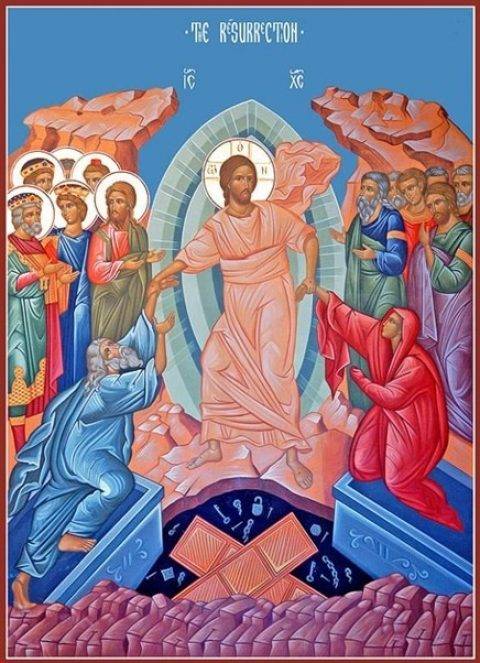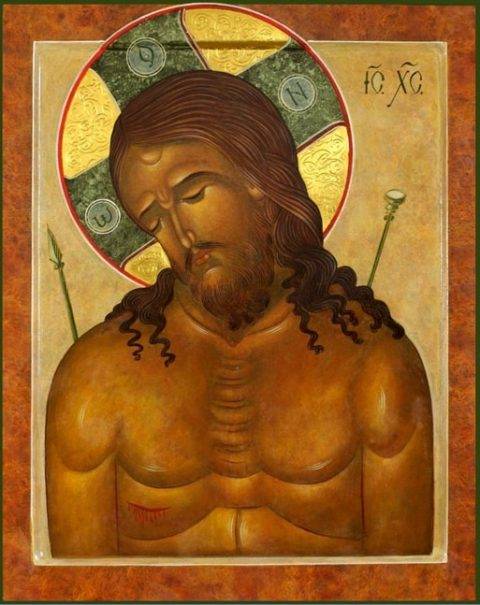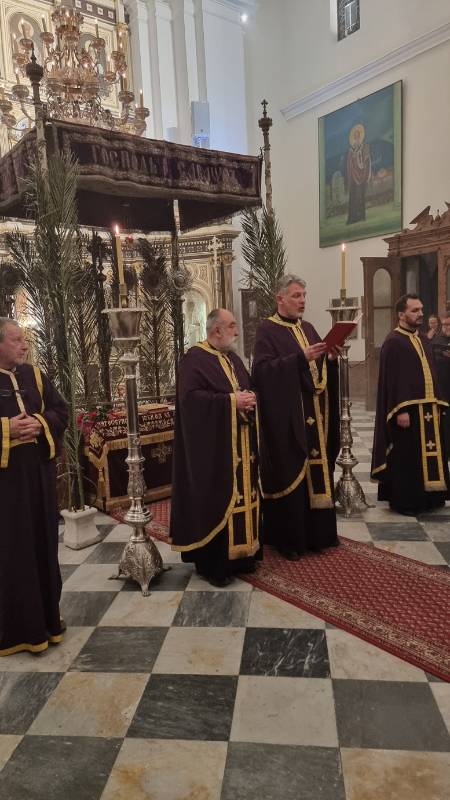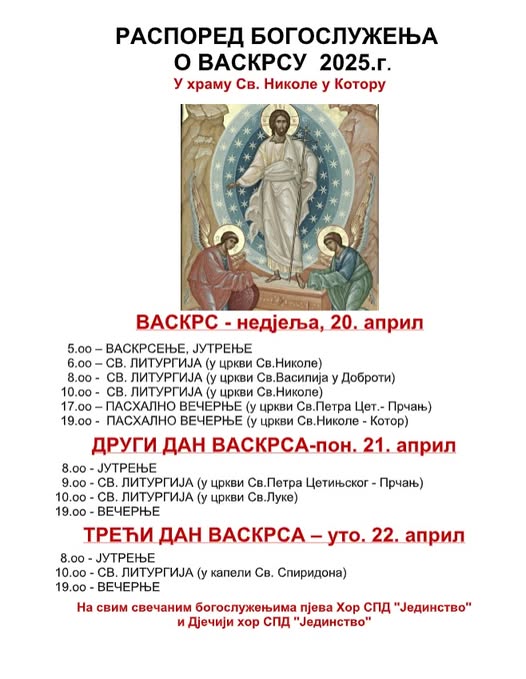F. NEMANJA KRIVOKAPIC BEFORE THE BEGINNING OF THE HOLY FAST: THE TREASURE THAT WE NEED TO COLLECT IS GOOD DEEDS
At the Holy Liturgy in the Church of St. Nicholas, today on the Sunday of Syropus before the beginning of the Holy Fast in anticipation of Easter, the Gospel according to Matthew was read (Mt. 6:14-21)
The hierarchal vicar of Kotor-Tivat, the parish priest of Kotor, Archpriest Nemanja Krivokapić, reminded in his sermon that in today's Gospel the Lord most directly tells us what to do and what not to do, in order to gain the Kingdom of Heaven.
"It also tells us how we should fast. We also heard how to forgive, which we say every day in the Lord's Prayer (that He may forgive us our debts as we forgive our debtors). The Lord also teaches us what treasures to gather. Worldly treasures are fleeting, unimportant, and can disappear at any moment, and secondly, when we present ourselves to the other world, they remain here. The treasures that we should gather are good deeds, the treasures that we carry to heaven. That is not forgotten and is not erased. What we have done for others,” said Fr. Nemanja, repeating that in today’s Gospel the Lord teaches us how to fast properly, so that we can understand the essence and point of fasting.
He indicated that fasting is not an end in itself, that we fast for the sake of fasting, in order to possibly eat a little less, but that fasting is a spiritual and physical preparation for something much more important, which is communion.
“Being a Christian, being Orthodox means living the life of the Church, through the holy mysteries. Being baptized, being anointed, but above all, taking communion, because that is our direct communion with God. We have this community through prayer and worship, but this is the most direct possible community with God where He enters us through the holy gifts that are transformed into bread and wine during the liturgy, the body and blood of Christ, and we receive God Himself into ourselves,” said Father Nemanja, adding that we need to prepare for communion, which we are otherwise never worthy of.
For this, he continued, fasting serves, the essence of which is the Holy Gospel, where at the beginning it says “and when you fast, do not frown like a hypocrite.”
“Even then, God draws attention to those who fast only for the sake of the theater, to see how they fast. This has always been the case throughout history, and it still exists today. So we fast for ourselves and for God. We can pretend to fast. We say we are fasting, but at home we are sulking. But what did I do then? Have I deceived God and have I deceived myself? We fast primarily for ourselves. Fasting is not a diet, but an exercise of our free will. God gave us free will as the greatest gift in which we can express ourselves as individuals, to choose good, freely, of our own free will, to choose what God has planned, or to fall away from it of our own free will, but then we ourselves bear the consequences. So, it is a great gift but also a double-edged sword. Nothing will happen if we fast, no one will put us in prison, but it is not good for us if we do not show that sacrifice, the sacrifice of doing something that is up to us in order to meet the Lord,” said Father Nemanja.
He recalled the first form of fasting when the Lord tells Adam in Paradise not to eat from the tree of the knowledge of good and evil, where he tests free will to see if he will do it or not.
"It's the same with us. We are not saved by food, neither this nor that. The problem is not in meat and milk. If it were a problem, we would never eat it. The Church has determined that certain types of food should not be eaten and we obey it. Of our own free will, we renounce certain types of food and perform some feat," said Father Nemanja.
The Gospel also teaches us in what order to fast.
“It teaches us that spiritual fasting is more important, how we relate to others, and then what we eat. “When you fast, anoint your head and wash your face” - it means that you first cleanse your thoughts and how you relate to others, whether you judge or insult someone or have you said a nice word or, even better, done a good deed, do you care about another, how they live, whether they have, whether they can… That is the real fast, and then logically comes the physical one that follows the spiritual fast. Fasting also has its forms, but we should not be slaves to it because the point is not some kind of “food training” but our free renunciation according to the measure in which we can do it. Not everyone can do the same, nor should we judge someone if they do not fast as we fasted, nor should we burden ourselves with burdens that we cannot bear. That's what the Church is for, that's what priests are for, that you consult with them when you want to confess and ask in your case how to fast. So, the point is not in what is eaten, but in our sacrifice, our feat, our effort to do something that will be our extended hand to the already extended hand of God. First of all, we think about our relationship with each other. Tonight, there is a wonderful service, many do not even know about it. Before the fast itself, this wonderful vespers is served. It is called the Forgiving Vespers, where very beautiful hymns and sticheras are sung that remind us that the fast begins with forgiving each other and at the end of that service, we ask each other for forgiveness before the start of the fast so that the fast is as pleasant as possible. May the Lord God grant that this Gospel will remind us of what fasting is, that we may fast with joy and prepare for the most important event, the meeting with the Lord, amen”, said among other things, Father Nemanja.
Gospel according to Matthew (Mt. 6:14-21)
14. For if you forgive men their sins, your heavenly Father will also forgive you.
15. But if you do not forgive men their sins, neither will your Father forgive your sins.
16. And when you fast, do not be gloomy like the hypocrites: for they disfigure their faces that they may appear to men to be fasting. Truly, I say to you, they have received their reward.
17. But you, when you fast, anoint your head and wash your face,
18. That you may not be seen by men to be fasting, but by your Father who is in secret; and your Father who sees in secret will reward you openly.
19. Do not store up for yourselves treasures on earth, where moth and rust destroy, and where thieves break in and steal;
20. But store up for yourselves treasures in heaven, where neither moth nor rust destroys, and where thieves do not break in and steal.
21. For where your treasure is, there your heart will be also.
PHOTOS
RELATED ARTICLES

Calendar for April 20 The Resurrection of the Lord Jesus Christ – Easter
“Now after the Sabbath, as it began to dawn toward the first day of the...

Calendar for April 19 Maundy Saturday
On the Saturday after the crucifixion, the chief priests and Pharisees came to...

GOOD FRIDAY - SOLEMN VIGIL WITH ARTICLES SERVED TONIGHT IN THE CHURCH OF ST. NICHOLAS
In the Church of St. Nicholas, today on Good Friday, a Solemn Vigil with...







.png)